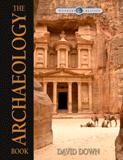Why Do We Have Leap Years?
Every four years, we have an extra day at the end of February. But why?
February 29 is a date that appears on our calendars once every four years (with some exceptions). Most people know that the reason for this is to keep our calendars in sync with the time it takes for the earth to go around the sun.
The Calendar in Creation Week
We know that humanity took note of these things and started recording time very early because Genesis 5 and 11 record the life spans of all the people from Adam to Terah.
God anticipated and provided for humanity’s need to record time by creating the heavens in such a way that the earth’s rotation in relation to the sun gives us the day/night cycle, the roughly 28-day lunar cycle gives a month (and dividing that into four gives us four weeks), and the time it takes for the earth to go around the sun gives us a year. We know that humanity took note of these things and started recording time very early because Genesis 5 and 11 record the life spans of all the people from Adam to Terah.
How do we know that the primeval year was the same as the years we have today? Again, Genesis gives us the answer—this time in the flood narrative. The account of the global flood has very detailed chronological statements.
Genesis 7:11: “In the six hundredth year of Noah’s life, in the second month, on the seventeenth day of the month, on that day all the fountains of the great deep burst forth, and the windows of heaven were opened.”
Genesis 8:4–5: “And in the seventh month, on the seventeenth day of the month, the ark came to rest on the mountains of Ararat. And the waters continued to abate until the tenth month; in the tenth month, on the first day of the month, the tops of the mountains were seen.
Genesis 8:13–14: “In the six hundred and first year, in the first month, the first day of the month, the waters were dried from off the earth. . . . In the second month, on the twenty-seventh day of the month, the earth had dried out.”
The narrative seems to imply that Noah was tracking time on the ark. It’s possible that he tracked months by moon phases, meaning that his calendar was very similar to the later Hebrew calendar, which was mainly a lunar calendar. That would mean that when Noah disembarked from the ark on the second month, on the 27th day of the month, he had spent one lunar year and 10 days on the ark, but one day short of a solar year.
This likely would not have been lost on the Hebrews in Moses’ day, who used a lunisolar calendar that had lunar months of 29 or 30 days and an intercalary month every three years to keep their lunar and solar calendars in sync.1
How Leap Year Keeps Our Calendar Accurate
The Gregorian calendar was first introduced in October 1582, and most countries today use the Gregorian calendar to record time because it makes the average year length most closely match the length of the solar year:
The Gregorian leap year rule is: Every year that is exactly divisible by four is a leap year, except for years that are exactly divisible by 100, but these centurial years are leap years if they are exactly divisible by 400. For example, the years 1700, 1800, and 1900 are not leap years, but the year 2000 is.2
This calendar is only about 27 seconds off from the true year, meaning that it will be over 3,000 years before a new calendar is needed,3 if Christ has not yet returned!
Why Is the Calendar Important for Christians?
One very important reason Christians have historically been concerned about calendars is that we want to celebrate Christ’s resurrection on the actual anniversary.
An accurate calendar is necessary for accurate planning for planting, harvesting, and planning for seasonal changes.
More generally, we glorify God when we exercise stewardship and dominion over creation, and using the heavenly bodies to track time, as God intended, is one way that we do that. An accurate calendar is necessary for accurate planning for planting, harvesting, and planning for seasonal changes.
What about ideas that climate change will in some way fundamentally alter the world as we know it? We have this promise that God gave when Noah sacrificed animals after disembarking from the ark:
While the earth remains, seedtime and harvest, cold and heat, summer and winter, day and night, shall not cease. (Genesis 8:22)
Footnotes
- Yale University Library, “About the Hebrew Calendar,” last updated October 6, 2014, https://web.library.yale.edu/cataloging/hebraica/about-hebrew-calendar#:~:text=The%20starting%20point%20of%20Hebrew,a%20cycle%20of%2019%20years.
- Astronomical Applications Department, “Introduction to Calendars,” accessed February 23, 2024, https://aa.usno.navy.mil/faq/calendars.
- Ethan Siegel, “Ask Ethan: How Long Do We Have Until We Need to Change Our Calendar?” Science, Innovation, Forbes, July 16, 2021, https://www.forbes.com/sites/startswithabang/2021/07/16/ask-ethan-how-long-do-we-have-until-we-need-to-change-our-calendar/?sh=245798a7645a.
Recommended Resources

Answers in Genesis is an apologetics ministry, dedicated to helping Christians defend their faith and proclaim the good news of Jesus Christ.
- Customer Service 800.778.3390
- © 2024 Answers in Genesis







